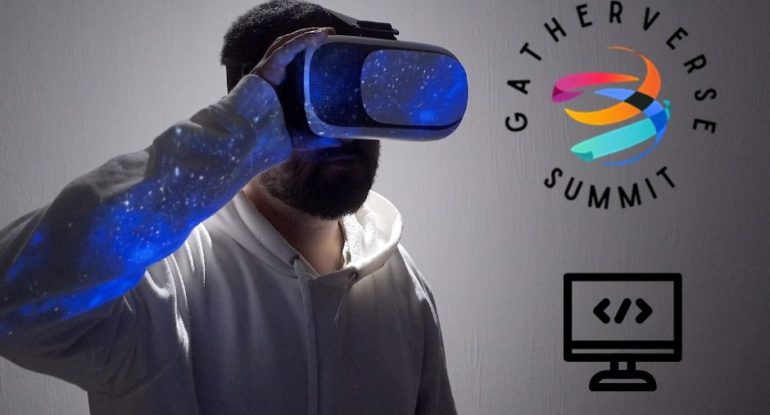GatherVerse is looking into the Open Metaverse Framework.

The four-day conference brought together a diverse group of professionals throughout the XR community.
The GatherVerse Summit took place from February 22 to 25. It featured a spectacular, all-inclusive list of expert presentations from global executives, researchers, and experts from across the extended reality (XR) sector in an attempt to conceptualize the rise of the next Metaverse framework.
Kent Bye, the producer of the Voices of VR podcast, gave listeners a detailed and logical approach to constructing the Metaverse, citing several useful sources and research.
Since the podcast’s inception in May 2014, Bye has worked with over 1,500 virtual reality professionals and pioneers, documenting the progress of consumer-facing VR.
Also, read – The Metaverse and How Does It Work in 2022. Everything You Need to Know
The Open Metaverse framework is a place where anything is possible.
Bye began his Summit lecture by defining the open Metaverse and the influential individuals involved in its creation.
According to Bye, the open Metaverse would become a “real-time 3D(RT3D) social medium where people may create and partake in shared experiences as equal participants in an economy with the social consequence,” citing Epic Games CEO Tim Sweeney.
According to Bye, an open Metaverse would require a “massively scaled and interoperable network of RT3D virtual worlds” that could be experienced “synchronously and persistently” by infinite users with individual presences. Bye said that the platform would allow data such as “identification, history, entitlements, objects, communications, and payments” to be maintained.
He also cited Lawrence Lessig, a US attorney, and political activist. He developed his Pathetic Dot Theory in 1998, which described how cultural norms would govern activity in the Metaverse, law, market dynamics, and the underlying technical architecture of coding, all of which would lead to the user experience.
He went on to say that GatherVerse Founder Christopher Lafayette concentrated on ethical aspects of the Metaverse. At the same time, Unity Technology’s Tony Parisi devised the Seven Rules of the Metaverse. Both specialists worked to create an inclusive, interoperable, and decentralized platform.
Theorists like Matthew Ball highlighted the Metaverse’s economic importance and material development through various technologies and industries. In his essay ‘Framework for the Metaverse,’ Ball writes,
“The Metaverse is best understood as ‘a quasi-successor state to the mobile internet’. This is because the Metaverse will not fundamentally replace the internet, but instead build upon and iteratively transform it.” He added that companies like Meta Platforms Inc and Microsoft had made essential contributions to the development of the Metaverse through ethics, robotics, architecture, infrastructure, and headsets.
Other entities, such as Niantic’s AR-based Lightship application program interface (API) and Jasmine Roberts, Google’s Senior AR Software Engineer, addressed the Metaverse framework from an engineering standpoint. According to Bye, they contributed to the many methods to develop the Metaverse framework.
He emphasized that, in the long run, participation from the entire XR community would lead to a future Metaverse capable of meeting the demands of its users based on a pluralistic approach to its formation.
Building the Metaverse framework in a Pluralistic Way
Kent Bye elaborated on the need for a pluralistic approach to the Metaverse framework, explaining that “different perspectives would develop and evolve the platform.”
“In this way, I wanted to say a few words about the value of pluralism, because as I look at all these different metaverse frameworks, it’s important to remember that the map is not the territory […] So in thinking about how that applies, here, you can think of it the metaphor of lots of people who are blindfolded on an elephant, and they each have a specific insight. So each framework is revealing some information about something, but it’s also concealing other things.”
Comprehensive Metaverse features such as foreign logical aspects of context quality, character, and story for virtual experiences, intersectionalism, and other ethical frameworks could help XR advocates design future structures for the burgeoning spatial communications platform.
GatherVerse is a 2021 event that intends to bring together the global XR community to discuss, document, and share “human-centered approaches to the [Metaverse].”



























































